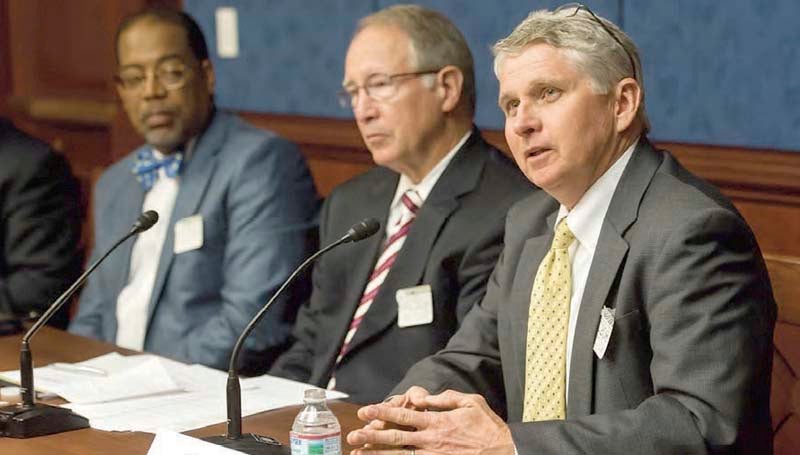Local hospital CEO briefs leaders on health policies
Published 12:46 pm Wednesday, October 16, 2013

PHOTO SUBMITTED / Hospital leaders (from left) Reginald Coopwood, M.D., CEO of the Regional Medical Center at Memphis; Michael Sack, CEO of Hallmark Health System in Medford, Mass.; and Alvin Hoover, CEO of King’s Daughters Medical Center in Brookhaven, walk legislators and their staff through the negative impact for patients and communities of paying hospitals the same rates as physician offices and ambulatory surgical centers for certain services, such as outpatient evaluation and management during a special Sept. 17 AHA briefing on Capitol Hill.
Besides serving as the chief executive officer of King’s Daughters Medical Center in Brookhaven, Alvin Hoover also is the chairman of the Small or Rural Governing Council of American Hospitals, an advocacy group that seeks to strengthen the role of hospitals and advocate on their behalf to policy makers.
Part of Hoover’s goal is to bring awareness to the issues that small or rural hospitals face, such as King’s Daughters Medical Center, in light of the new changes to health care with the Affordable Care Act or ‘Obamacare.” Hoover is equally concerned by policies Mississippi has decided to implement, including the state’s decision to not expand Medicare.
In Washington, D.C., Hoover joined Sens. Thad Cochran and Roger Wicker and U.S. Rep. Gregg Harper to educate the House and the Senate on a number of pressing issues that Hoover finds troublesome, or problematic down the road, for King’s Daughters Medical Center.
Among them include the recommendation by MedPAC or the Medicare Payment Advisory Commission, to equalize Medicare payment rates between hospital outpatient departments, or HOPD, and physician office settings.
Since hospitals have a much higher overhead than physicians’ offices do, Hoover proposes that an equal pay scale doesn’t coincide with equal expenses. Hoover cites the following additional issues and expenses that hospitals face, which physicians’ office don’t:
• HOPDs have a higher cost structure due to emergency stand-by capacity and regulatory requirements.
• Medicare margins continue to decline for HOPDs, making additional cuts in funding threatening to King’s Daughters Medical Center and other similar-sized hospitals, Hoover said.
• HOPDs provide services in the community to vulnerable patient populations.
• Equalizing payments will impede efficient, coordinated care, Hoover said.
• As a rule, hospitals have more comprehensive licensing, accreditations and regulatory payments.
Hoover spent three days of meetings and briefings in Washington, D.C., from Sept 15-17. He is cautiously optimistic that the information and insight that he was able to convey will lead to future changes.
“It takes a long time for the wheels to start turning in Washington. I’m hopeful that with the help of our state congressman and senators, the process can be expedited, he said.
Hoover also provided the House and Senate with a primer on the moves he has made at King’s Daughters Medical Center to educate his workforce and train them on ways to handle diversity.
“We are trying to be proactive in training our employees on relating to all segments of the population. Whether the patient is from Generation X, Generation Y, the Baby Boom generation, there are certain ways to deal with different age groups,” Hoover mentioned.
This philosophy doesn’t just rest with patient interactions, though.
“Our counsel attempts to do the same with our employees, and their interaction with each other,” continued Hoover.
Recently, Modern Healthcare magazine, a relied-upon news source for health care professionals, included King’s Daughters Medical Center in their 100 best places to work in healthcare, a significant honor, said Hoover.
“This is a really big deal. I’m very proud of my staff and some of the things we are doing at the hospital. We continue to move forward,” Hoover said.
Hoover will travel to Atlanta, Monday, Oct. 21, for the Modern Healthcare awards ceremony.

